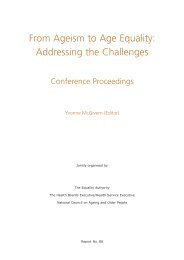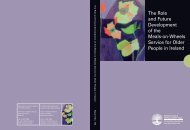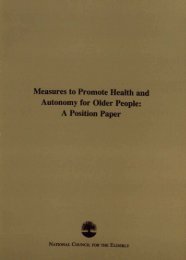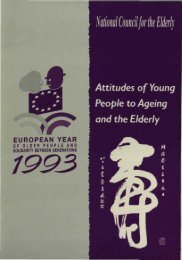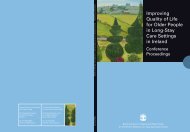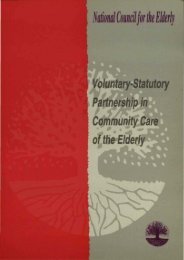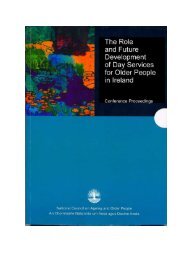Improving Quality of Life for Older People in Long-Stay Care ...
Improving Quality of Life for Older People in Long-Stay Care ...
Improving Quality of Life for Older People in Long-Stay Care ...
- No tags were found...
You also want an ePaper? Increase the reach of your titles
YUMPU automatically turns print PDFs into web optimized ePapers that Google loves.
The prevalence <strong>of</strong> quality deficits <strong>in</strong> residential care across OECD countries hasled to <strong>in</strong>ternational concern about the quality <strong>of</strong> care and quality <strong>of</strong> life <strong>in</strong> long-stay<strong>in</strong>stitutions. In general, governments have focused on develop<strong>in</strong>g and en<strong>for</strong>c<strong>in</strong>gbasic regulatory frameworks <strong>for</strong> m<strong>in</strong>imally acceptable quality <strong>of</strong> care standards <strong>in</strong>residential care. In addition, most countries have developed and implemented asecond layer <strong>of</strong> quality <strong>in</strong>itiatives <strong>in</strong> order to ensure that standards <strong>of</strong> care exceedm<strong>in</strong>imum requirements and positively enhance the health and well-be<strong>in</strong>g <strong>of</strong>residents. The development <strong>of</strong> a third layer <strong>of</strong> <strong>in</strong>itiatives designed to enhancequality <strong>of</strong> life <strong>in</strong> residential care has not always been <strong>for</strong>thcom<strong>in</strong>g, either voluntarilyor through regulation. Even allow<strong>in</strong>g <strong>for</strong> def<strong>in</strong>itional and measurement difficulties,more needs to be done to <strong>in</strong>crease the regulatory and policy focus on quality <strong>of</strong> life,<strong>in</strong> addition to quality <strong>of</strong> care, <strong>in</strong> residential sett<strong>in</strong>gs. Such an approach would focuson both the physical and social environment with<strong>in</strong> long-stay sett<strong>in</strong>gs and theirimpact on the quality <strong>of</strong> life <strong>of</strong> residents. It would challenge ageist attitudes amongproviders, place the focus firmly on the rights and needs <strong>of</strong> residents, and ensureperson-centred tra<strong>in</strong><strong>in</strong>g <strong>for</strong> all staff provid<strong>in</strong>g care <strong>for</strong> older people. <strong>Quality</strong> <strong>of</strong> life<strong>for</strong> older people is an issue <strong>for</strong> everyone, both with<strong>in</strong> residential care sett<strong>in</strong>gs andoutside. As such, any <strong>in</strong>itiatives designed to enhance quality <strong>of</strong> life <strong>for</strong> dependentpeople <strong>in</strong> residential care sett<strong>in</strong>gs should apply equally to older dependent peopleliv<strong>in</strong>g at home.21312.2 Methodology and ModelAs a concept, quality <strong>of</strong> life can mean anyth<strong>in</strong>g to anybody and there is noconsensus on the mean<strong>in</strong>g <strong>of</strong> quality <strong>of</strong> life, especially with respect to olderpeople <strong>in</strong> long-stay care. The measurement <strong>of</strong> quality <strong>of</strong> life is a difficult andcomplex exercise. For this study, objective data was collected on dimensions<strong>of</strong> residential care that previous research <strong>in</strong>dicated were likely to impact on thequality <strong>of</strong> life <strong>of</strong> residents. This was conducted through a postal questionnaire toall known long-stay facilities <strong>in</strong> the country. The overall response rate to the surveywas 62 per cent. The subjective views on quality <strong>of</strong> life <strong>of</strong> both residents and staff<strong>in</strong> residential care were also explored, through study site work <strong>in</strong> 12 sites acrossthe country. The rationale <strong>for</strong> the study site work was the belief that an <strong>in</strong>dividuals’sown sense <strong>of</strong> the ongo<strong>in</strong>g narrative <strong>of</strong> life is more mean<strong>in</strong>gful than an outsideexpert’s construction <strong>of</strong> objective reality. Hear<strong>in</strong>g the voice <strong>of</strong> older people wascentral to this study and the phenomenological nature <strong>of</strong> the study site <strong>in</strong>terviewsfacilitated this, thus ensur<strong>in</strong>g an authentic account <strong>of</strong> quality <strong>of</strong> life as older people







